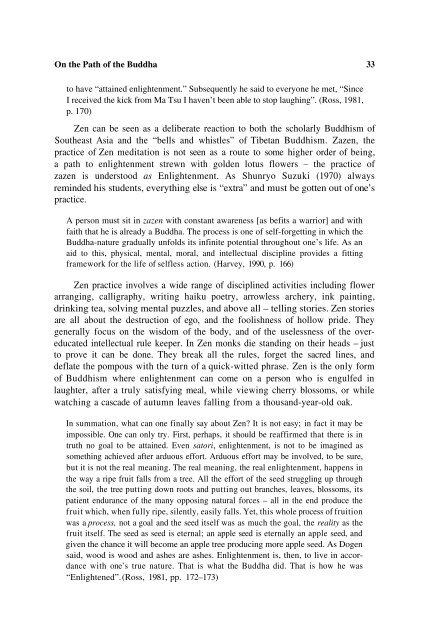Psychology & Buddhism.pdf
Psychology & Buddhism.pdf
Psychology & Buddhism.pdf
Create successful ePaper yourself
Turn your PDF publications into a flip-book with our unique Google optimized e-Paper software.
On the Path of the Buddha 33<br />
to have “attained enlightenment.” Subsequently he said to everyone he met, “Since<br />
I received the kick from Ma Tsu I haven’t been able to stop laughing”. (Ross, 1981,<br />
p. 170)<br />
Zen can be seen as a deliberate reaction to both the scholarly <strong>Buddhism</strong> of<br />
Southeast Asia and the “bells and whistles” of Tibetan <strong>Buddhism</strong>. Zazen, the<br />
practice of Zen meditation is not seen as a route to some higher order of being,<br />
a path to enlightenment strewn with golden lotus flowers – the practice of<br />
zazen is understood as Enlightenment. As Shunryo Suzuki (1970) always<br />
reminded his students, everything else is “extra” and must be gotten out of one’s<br />
practice.<br />
A person must sit in zazen with constant awareness [as befits a warrior] and with<br />
faith that he is already a Buddha. The process is one of self-forgetting in which the<br />
Buddha-nature gradually unfolds its infinite potential throughout one’s life. As an<br />
aid to this, physical, mental, moral, and intellectual discipline provides a fitting<br />
framework for the life of selfless action. (Harvey, 1990, p. 166)<br />
Zen practice involves a wide range of disciplined activities including flower<br />
arranging, calligraphy, writing haiku poetry, arrowless archery, ink painting,<br />
drinking tea, solving mental puzzles, and above all – telling stories. Zen stories<br />
are all about the destruction of ego, and the foolishness of hollow pride. They<br />
generally focus on the wisdom of the body, and of the uselessness of the overeducated<br />
intellectual rule keeper. In Zen monks die standing on their heads – just<br />
to prove it can be done. They break all the rules, forget the sacred lines, and<br />
deflate the pompous with the turn of a quick-witted phrase. Zen is the only form<br />
of <strong>Buddhism</strong> where enlightenment can come on a person who is engulfed in<br />
laughter, after a truly satisfying meal, while viewing cherry blossoms, or while<br />
watching a cascade of autumn leaves falling from a thousand-year-old oak.<br />
In summation, what can one finally say about Zen? It is not easy; in fact it may be<br />
impossible. One can only try. First, perhaps, it should be reaffirmed that there is in<br />
truth no goal to be attained. Even satori, enlightenment, is not to be imagined as<br />
something achieved after arduous effort. Arduous effort may be involved, to be sure,<br />
but it is not the real meaning. The real meaning, the real enlightenment, happens in<br />
the way a ripe fruit falls from a tree. All the effort of the seed struggling up through<br />
the soil, the tree putting down roots and putting out branches, leaves, blossoms, its<br />
patient endurance of the many opposing natural forces – all in the end produce the<br />
fruit which, when fully ripe, silently, easily falls. Yet, this whole process of fruition<br />
was a process, not a goal and the seed itself was as much the goal, the reality as the<br />
fruit itself. The seed as seed is eternal; an apple seed is eternally an apple seed, and<br />
given the chance it will become an apple tree producing more apple seed. As Dogen<br />
said, wood is wood and ashes are ashes. Enlightenment is, then, to live in accordance<br />
with one’s true nature. That is what the Buddha did. That is how he was<br />
“Enlightened”.(Ross, 1981, pp. 172–173)











